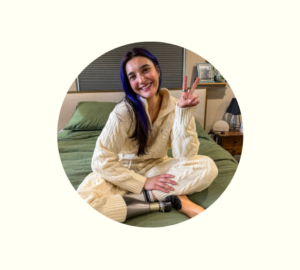The start of a new year often comes with ambitious goals for sweeping changes, which, all too often, fizzle out by February. But resolutions don’t have to be overwhelming. Instead, small, science-backed changes to your daily routine and mindset are much more likely to lead to lasting improvements in physical and mental health.
We asked members of Oura’s behavioral science team, including Sofia Strömmer, PhD, Behavioral Scientist, and Johanna Still, Head of Insight Messages, for their tips on setting goals for the new year that aren’t about perfection, but about progress.
As you enter the new year, consider taking some of these achievable steps to bring balance to your life.
| Member Tip: In the Oura App, you can select a focus area, such as improving athletic performance, managing stress, or staying present. Your focus area affects the daily insight messages you receive based on your Readiness Score. Change your goal at any time by going to “My Profile” in the app—the start of a new year is a great time to revisit your goals! |
RELATED: How to Make Better New Year’s Resolutions, According to Oura’s Behavioral Scientist
1. Add in 5 minutes of movement throughout the day.
If you’re looking to add more activity to your routine, there’s no need to run a marathon right off the bat (or ever!). In fact, all you need is five minutes to boost your health.
A recent study from the British Journal of Sports Medicine found that just five additional minutes of exercise daily can lower blood pressure and improve cardiovascular health. Another 2024 study showed that adding small amounts of exercise into daily routine, such as climbing stairs or cycling, could help to reduce blood pressure, with just five minutes a day estimated to yield improvements.
Each day, aim to add five minutes of movement breaks—whether it’s a stretching session, taking the stairs, or even a quick dance break in your kitchen. These mini-movements can add up to major benefits.
| Member Tip: You can set a personalized activity goal in the Oura App, which dynamically adjusts based on your daily Readiness Score. Also, be sure to enable inactivity alerts, which provide gentle reminders to integrate movement into your day. |
2. Meditate for just 10 minutes.
Meditation has been shown to lower cortisol levels, reduce anxiety, and improve emotional well-being, according to research published in JAMA Internal Medicine. It doesn’t even have to take up a lot of time: Even a 10-minute daily practice can help quiet your mind.
With Oura, it’s easy to make meditation a daily habit. Check out the Explore content, a catalog of more than 50 guided audio sessions from Oura’s own world-class instructors and partners such as Headspace.
For select sessions, you’ll also see biofeedback immediately after your session, showing the impact of the practice on your resting heart rate, heart rate variability (HRV), and other metrics.
| Member Tip: Up for a challenge? Improve your mental health right off the bat with Headspace’s 10-day New Year’s challenge: Ready, Set, Reset. Headspace’s content is designed to help you find more happiness and stress less through expert-led guided activities. Start your 14-day free Headspace trial today—enter code OURANEWYEAR25 here. |
3. Dabble in a new creative hobby.
Research shows that engaging in creative activities can boost your mental health and can help reduce symptoms of anxiety and depression. Whether you choose to pick up a watercolor set, do a daily crossword or sudoku, or journal for a few minutes each morning, trying something new can reignite your creative spark. Engaging in these leisure activities can lead to a more positive mood, less stress, and a lower heart rate. So dabble in some creative “me-time” and use Oura’s Tags feature to track how it may impact your stress levels or sleep quality over time.
4. Speak kindly to yourself.
“I need to work out more and stop being lazy.”
“I should stop eating sugar—my diet is terrible.”
“Why can’t I stick to any habit?! I’m the worst.”
Sound familiar? If so, you’re not alone. It’s easy to be hard on yourself, Strömmer says, but it’s not helping you achieve your goals.
“Changing our health behaviors because we feel like we ‘have to,’ or out of a sense of pressure or shame, is more likely to lead to us procrastinating, hating every second, and eventually falling off the wagon,” she explains. “In other words, feeling bad about ourselves is a motivator that, if at all, only works in the short term. At worst, it can lead to unhealthy patterns of behavior.”
A better approach: Be kind to yourself, and try to give yourself credit for the positive things you’re already doing. Research shows that when people think more positively about their current behavior, it actually leads to better progress and intentions toward achieving their goals.
Try to find at least one positive thought related to your goal and efforts, Strömmer suggests. This can help “rewire” your brain to run on more positive fuel, helping you keep your achievements within reach. For example:
“It feels so good to move my body. Today, I can walk an extra 5 minutes to reap more of those benefits.”
“What would I say to my best friend who was finding this hard? I’d tell them to do what they can, and I can do that for myself too.”
“I’ve made some progress, which is way better than nothing—I’m on my way!”

5. Spend quality time with friends and family.
Social connections are vital for mental health, with studies showing that strong social ties are linked to lower rates of anxiety, depression, and even improved longevity. Whether it’s sending a message or scheduling a coffee catch-up, small steps can make a big difference in improving your mood and stress levels. You don’t always even need to seek IRL connections, notes Still: Online social groups can help create a sense of connection and community, especially when groups form around a shared interest or hobby.
| Member Story: This 31-year-old Oura member discovered that his HRV increased by over 20% when visiting friends and family, showing the positive health effects of spending time with loved ones. |
6. Express gratitude.
If there’s one mental shift to make this year, consider an “attitude of gratitude.” According to research from the Greater Good Science Center, practicing gratitude can deliver a host of benefits for your mental health, enhance relationships, and even contribute to better physical health.
It can be as simple as a genuine compliment to someone at work, or saying “thank you” to someone who’s made your life a little easier. Studies have shown that acts of kindness, including compliments, can increase feelings of happiness—for both the giver and the receiver.
7. Ask yourself one simple question before reaching for a drink.
Cutting back on alcohol is a popular topic right now, as the concept of “sober-curious” has entered the mainstream lexicon. There are many reasons to limit your alcohol intake, from wanting to be more productive and energetic to avoiding the dangerous health consequences of consuming too much. Unfortunately, reaching for a drink is often more of a habit—instead of a need.
One simple strategy to help you interrupt this mindless habit is to practice mindfulness. Before pouring or ordering a drink, take a moment to ask yourself, “Do I actually want or need a drink right now?” If the answer is no, ask yourself, “So why am I considering it?” That answer is often related to anxiety, stress, or social pressure.
Reflect on the factors that make you want to drink and consider ways to address these issues more consciously, whether through self-soothing strategies or seeking professional help to work through them.
RELATED: 6 Myths About Alcohol, Debunked
8. Just breathe.
It’s something you do automatically without even thinking about it, but taking a few minutes to focus on your breath throughout your busy day can create positive ripple effects for your mental and physical health.
Deep breathing has been proven to lower heart rate and reduce stress, as shown in research from Harvard Medical School, and just five minutes of focused breathing can improve mental clarity and resilience. Find guided breathing exercises in Oura’s Explore Content to address a variety of situations, like reducing stress or calming your mind for sleep.
READ MORE: 10 Simple Breathing Exercises for Sleep and Relaxation











